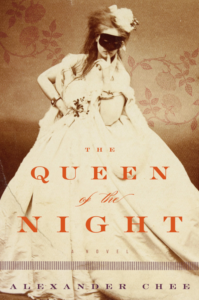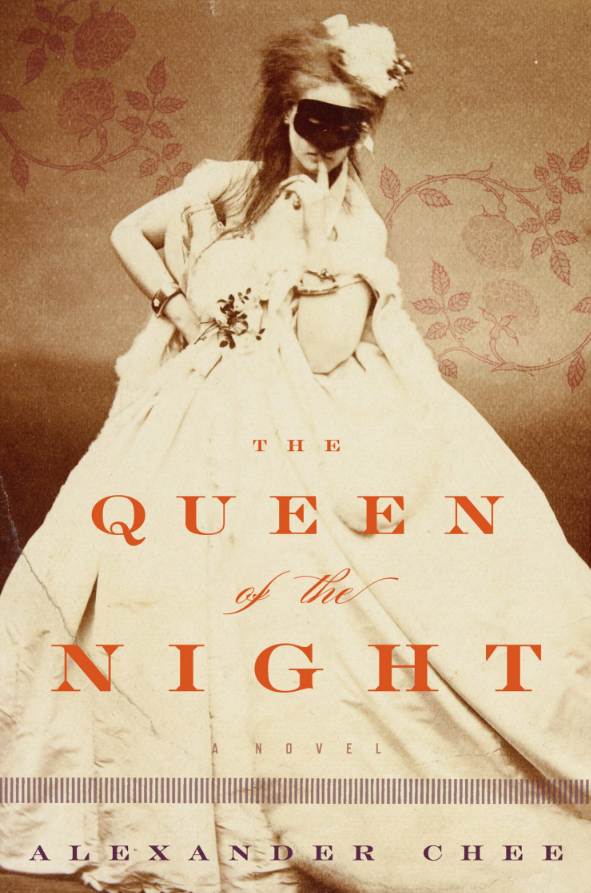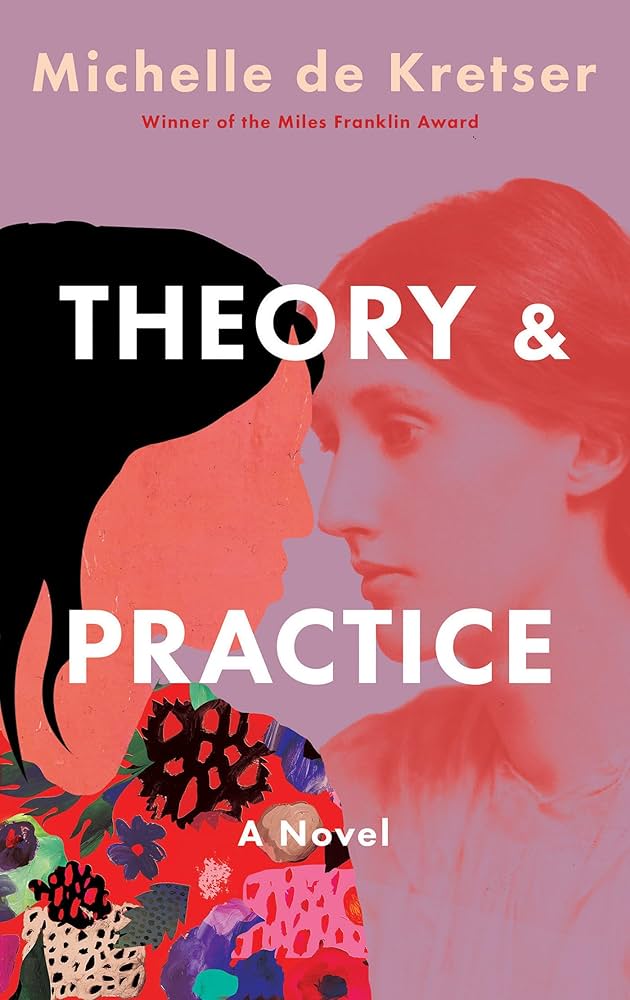Book by ALEXANDER CHEE
Reviewed by

Every so often a contemporary novel makes me want to go back to college—not because I don’t get it, but because the book induces a craving to know everything about its world. Reading The Queen of the Night, Alexander Chee’s hefty second novel, ten years in the making, I was ready to fill out the applications for a Master’s in 19th century French history and literature (with a minor in opera).
Set mostly in France under the Second Empire, (1866–1872), it’s the first-person narrative of a silver-voiced American orphan and master of self-reinvention, who becomes a European opera star and brushes the pinnacles of European power before crashing back to earth in the New World. Her rebirth wouldn’t be out of place on reality TV.
The Queen of the Night has the flamboyance and ambition of opera and accordingly is divided into acts rather than books or parts. It’s also a tall tale and a picaresque—in the vein of the late Canadian writer Robertson Davies’ marvelous Deptsford Trilogy, about a poor Ontario boy who runs away with a carnival and surfaces as a world-famous magician. Chee shares with the late Davies a particular relish for turning the illusions of performance inside out.
The book is deeply grounded in the history of the Second Empire and the beginning of the Third Republic, as well as the lives of opera celebrities and courtesans (often one and the same). Both the Comtesse de Castiglione, Napoleon III’s mistress and pan-European manipulator, and the famous singer and voice teacher Pauline Viardot-Garcia, play pivotal roles. Napoleon III aka Louis-Napoleon and his wife Eugénie, do as well, but from offstage mostly. Giuseppe Verdi, Ivan Turgenev, George Sand, Prince Metternich, and Cora Pearl also get their moments, as does PT Barnum.
Chee says he’s not a fluent French speaker. Yet, the book resonates as deeply authentic to a degree that reminded me of Hilary Mantel’s Wolfe Hall and Bring Up the Bodies. It’s a critical trope these days to compare long, plotty contemporary novels to Dickens or other 19th-century heavyweights. The Queen of the Night really does earn the comparison.
Like a simmering pot-au-feu, Chee’s writing gives off an aroma of 19th-century French novels about penniless outsiders clawing their way over the walls of high society—the literary obsession of the period (more so even than adultery). Lilliet is a Rastignac, the French expression for a ruthlessly ambitious young provincial nobody, from the protagonist of Balzac’s Le Pere Goriot, Eugène de Rastignac. But she also shares with Countess Olenska, Daisy Miller, Undine Sprague, and other social climbers of Henry James and Edith Wharton, a distinctly American naïveté in presuming she can crack European society by sheer determination.
The novel opens in 1882, with Lilliet Berne—a diva known as La Générale—arriving at the Sénat ball at the Luxembourg Palace. What should have been a triumphal entrance is marred by the sudden realization that she chose an impossible dress, a pink confection suited for an ingenue. Hesitating, she’s detained by a young writer, a bit of a Rastignac himself. He’s written a novel based on a scene he witnessed at the 1867 Exposition Universelle. A performer known as the Settler’s Daughter from a Canadian Wild West show was unable to speak but sang so beautifully that Emperor Napoleon III, who was in the audience, gave her a tiny ruby brooch of a rose. The writer has discovered the brooch and her diary in a house he bought, and from it has invented a story. A protégé of Verdi’s is writing an opera based on the novel, an opera set in a circus. Would she agree to sing the role of the girl?
She is tempted. For all her accolades, no one has written an opera for her. She has sung most of the roles of her fach, the category of voice based on the German system of operatic vocal types—hers being the rare “falcon,” described as the tragic soprano, a voice of unusual richness and fragility.
Mostly, she is stunned. She was the Settler’s Daughter, the brooch lost years ago. After one of the great costume changes in literature (no spoilers, sorry), she regains her composure (fabulously dressed) and makes a proper entrance, complete with aria—the Jewel Song from Faust—before an entranced crowd. But, of course, she wonders whether the writer knows this is her story. And if so, who told him? Only five people know it, and one is presumed dead. She visits each one, each visit a pretext to delve into that phase of her life.
These delvings take us a long way. We don’t advance from the present of the opening scene until Act V on page 420, by which time, we’ve learned that she began as a Minnesota farm girl with a beautiful voice that she liked to show off until her devout mother forced her to wear a gag except at meals. Pretending a fever took her voice to punish her mother, she’d planned a miraculous recovery, when an epidemic took the rest of the family. Chee says in an interview with The Common that Lilliet is driven by the desire not to be limited by others’ definitions of her. Putting Lilliet on the analyst’s couch, her need to be heard also seems like a subconscious quest to reverse her mother’s punishment.
Setting out to find her Swiss relatives, she takes the name Lilliet Berne from an infant’s grave, manifesting early her signature willingness to change identity. A touring circus gig brings her to Paris. She falls into prostitution. A rich tenor buys her contract from the maison close (French for upscale whore house) and sets about turning her into a singer, introducing her to the dazzling world of opera courtesans. But her drive to escape him and her chattel status of prostitute is primordial. She flees him, lands in jail, swaps identities with a dead girl, and emerges as a mute laundress. Muteness gets her a job with the scheming Comtesse de Castiglione. The Comtesse sends her to work as the Empress’s maid and to spy on her. But on encountering the tenor at Compiègne, the autumn residence of the court, she flees her post, incurring imperial wrath and the risk of prison or worse. Complicating matters, Lilliet has fallen in love with Eugénie’s lover, a composer, after a brief, erotic encounter. The Comtesse offers Lilliet a murky deal she doesn’t understand and can’t refuse, which protects her from Their Majesties but also binds her permanently to the tenor on pain of the Comtesse’s vengeance.
Chee explored the connections between singing and sexuality in his poetic first novel,Edinburgh, about the long-term repercussions of a pedophile chorus teacher’s abuse on a group of young boys in Maine. The Queen of the Night is vastly more complex, but similarly rooted in its understanding of the ways that a beautiful voice makes the singer powerful and vulnerable.
The tenor takes her to Germany to study with Pauline, an artistic idyll that lasts until the Franco-Prussian War forces her back to Paris. There she finds her composer only to see him die (apparently). At the end of the Second Empire, she finally outwits the tenor (she thinks). Act IV ends on her debut. Act V opens at the height of her career, eight years later, as she waits for the opera about herself.
She finds the composer—it’s he, of course, who has written the opera—but is not pleased at the elaborate mystery he concocted to surprise her with his gift. Meanwhile, the tenor is not done with her. (I won’t give away the resolution of their rivalry, except to say that the 19th-century plot-masters would probably give it a thumbs-up.)
The star-crossed circus opera doesn’t become the European court extravaganza the composer envisioned. Chee leaves open the possibility that it may prove a triumph, in the vein of Swedish soprano Jenny Lind’s famous two-year retirement tour of America produced by PT Barnum. (He gets his scene.) But it’s also a homecoming—which she describes in a way that the congregation she entranced with hymns in the prairie church where she first sang would have understood as not being entirely terrestrial.
At times in The Queen of the Night, Lilliet is the linchpin of so many schemes in the love and political triangle of the Emperor, the Empress, and the Comtesse that it’s hard to catch all the nuances. This is where that Master’s program would come in handy. The Second Empire is the period of French history when it became clear that the changes wrought by the French Revolution were irreversible, despite the efforts of Monarchists. Chee tells us a good deal, but reasonably, doesn’t emulate Victor Hugo, who devoted 40 plus pages to the Battle of Waterloo in Les Misérables to elucidate the multiple roles of the villainous Thénardiers.
The book does digress into an encyclopedic range of subjects as Lilliet wanders through the underworld of European society—but the sense of being initiated into secret lore, give these passages tension and momentum. Here’s Lilliet, novice prostitute, on the world of the maison close:
A great scandal appeared in the press shortly after I joined the house… a disappointed lover had rifled through a courtesan’s books hoping to find the truth as to whether she loved him, only to see she was not kind to him, at least there. She was made to seem insincere in the press, and this angered us. It was like charging backstage, shocked to discover Phèdre had been played by an actress when you knew all along you were in the theater.
Or on her dual role as fugitive and the Empress’s wardrobe girl in the Tuileries:
In days measured as carefully as one of Her Majesty’s gowns, I grew to be at peace with my lot in life somehow… I was hidden deep inside the enormous machinery of the institution that was dressing the Empress for her public and private appearances…
There are instructive passages, such as the one on disposing of jewelry from discarded lovers. (Sell at the end of an affair, when there is no hope. If you need money, sell stones—not whole pieces—so as not to embarrass the lover.)
Interestingly, the sex is handled discreetly. In this, Chee may have been influenced by the memoirs of the courtesan Celeste Mogador, an important source, he says. She was much more interested in the details of the abuse of women prostitutes than sex.
Plots of operas, including “The Magic Flute,” from which the title comes, are also woven into the fabric of the book. Lilliet does explain them as she discurses on her roles and their meaning for her story. They are almost a code between her and the tenor as her training and career advance. Still, opera plots are not finely wrought as narrative, and here I found the going difficult. “The Magic Flute” has an almost nonsensical plot, as Lilliet points out. (Here’s the Metropolitan Opera’s synopsis.) Briefly, the Queen of the Night is the manupulative and vindictive mother of the lovely princess Pamina, who is the captive of Sarastro. The Queen enlists a handsome prince, Tamino, to rescue Pamina from Sarastro, promising him her hand. But Sarastro turns out to be a good guy and both Pamina and Tamino go over to his side. In Act II, the Queen orders Pamina to kill Sarastro in a famous and diabolically difficult aria (“The revenge of hell boils in my heart…”). Lilliet sings the Queen of the Night’s aria in a fit of fury for the first and only time on the evening when all is revealed—a calculated risk after which her voice is never the same.
Who is the Queen of the Night here? The Comtesse is the most diabolical and powerful woman in the story, mistress of dark political arts. But this is Lilliet’s story and it seems almost perverse to let the Comtesse own its title, even if she’s the behind-the-scenes villainess. Night is the hour of opera, and for a time, acclaimed as La Générale and followed by adoring crowds, Lilliet is indeed the Queen. As the curtain falls, she seems to be gazing bravely into another kind of night.
In any case, one doesn’t need to be an opera buff to appreciate Chee’s evocation of that world. Discovering Pauline Viardot-García in these pages was a dividend. She was a famous mezzo-soprano, teacher, and composer, daughter and sister of opera singers, and piano student of Liszt who is better known to music historians than to the general public. She lived with Ivan Turgenev and her husband, Louis Viardot—a relationship that’s tenderly evoked—and held famous musical salons where she staged chamber operas. On meeting Pauline, Lilliet finds her role model and subordinates her quest for freedom to her art:
I’d never met a woman like Pauline and had met her at a time when I feared not one woman like her existed in all the world. In some way, I had never known how to express, I’d feared I would have to become the first of my kind, whatever my kind was, should I be allowed to survive—that which history has never seen before… And whether or not she could teach me to sing with this strange voice of mine, I wanted to learn to be like her as much as possible, and so I did not feel like a captive now. I felt saved. To leave would mean leaving this education undone.
The relationship between the women, as well as Lilliet’s struggles, imbue the story with an empathetic feminism captured in this paragraph near the end:
In this world, some time long ago, far past anyone’s remembering, women as a kind had done something so terrible, so awful, so fantastically cruel that they and their daughters and their daughter’s daughters were beyond forgiveness until the end of time… made to suffer for the least offenses committed against any man. What was remembered were the terms of our survival as a class: We were to be docile, beautiful, uncomplaining, pure, and failing that at the least useful. In return, we might be allowed something like a long life. But if we were not any of these things, by a man’s reckoning, or if perchance we violated their sense of that pact, we would have no protection whatsoever and we were to be treated worse than any wild dog or lame horse.




